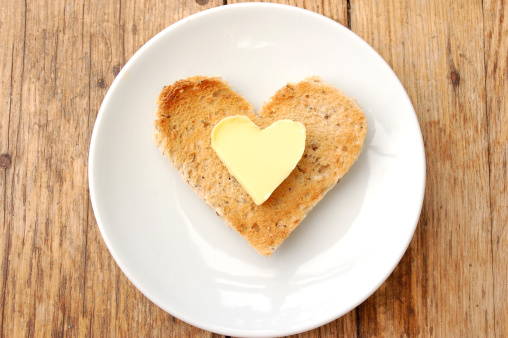 Over the past few years, governments across the globe have been fixated on lowering cholesterol levels in order to reduce the occurrence of heart disease. Butter and cheese have long been avoided in a healthy diet, as they contain high amounts of saturated fats and calories. But recent research now flies in the face of all that – now scientists say that butter and cheese may be heart health foods after all, and that including them in your diet could be a better approach to heart problems.
Over the past few years, governments across the globe have been fixated on lowering cholesterol levels in order to reduce the occurrence of heart disease. Butter and cheese have long been avoided in a healthy diet, as they contain high amounts of saturated fats and calories. But recent research now flies in the face of all that – now scientists say that butter and cheese may be heart health foods after all, and that including them in your diet could be a better approach to heart problems.
Advertisement
Aseem Malhotra, Cardiology Specialist in Croydon University Hospital, London, reports that the trans-fats found in many fast foods, baked goods and margarine are a definite health problem, but that the natural saturated fats found in cheeses, butter, and red meat are actually of benefit to heart health.
He claims that the obsessive removal of saturated fat from our foods have, paradoxically, increased our risk for heart disease, and the health implications of saturated fat may depend more on what type of foods the saturated fat came from. Dairy products, for example, contain vitamin D, calcium and phosphorus, which have all been shown to reduce the risk of heart disease. Even moderate amounts of fresh red meats can be included among the ranks of heart healthy foods. Conversely, consuming heavily processed meats has been linked to higher rates of heart disease.
People have misguidedly embraced “low-fat” and “no-fat” products, assuming they would help them lose weight and stay fit. Most of these products, however, contain insidiously high levels of sugar. Malhotra illustrated his point by describing a patient of his. She was in her 40s, and made a point to only drink low-fat drinks. Her 5-drink a day routine – which often included a 450 mL container of low-fat flavored milk drink containing 15 teaspoons of sugar – caused her to put on 20kg of weight in 6 months, triggering a heart attack.
Malhotra also maintains that the benefits of using statins, a group of over-prescribed cholesterol-controlling drugs, are far outweighed by their detrimental side effects.
Heart Health Involves Balancing Fat, Not Eliminating It
People must be educated to avoid “no fat” products, and to consume reduced fat products with care. Butter and unprocessed cheeses are naturally endowed with healthy nutrients, and if eaten properly, are actually better than low-fat spreads and margarines. Rather than skipping straight to statin drugs, people with cardiovascular risks should first try to mitigate their health by eating a Mediterranean diet, rich in fruits, vegetables, fish, nuts and olive oil. A recent study showed that the heart healthy foods in the Mediterranean diet – which contain fair amounts of saturated fats in addition to unsaturated fats – are actually more than three times as effective at preventing further complications after a heart attack.
Advertisement
Malhotra’s findings and arguments all boil down to one simple idea: while statin drugs and other drugs may be able to keep your heart in working order, they will never be able replace a natural diet filled with heart healthy foods. Despite popular advertising, low-fat foods (like other artificially engineered foods) have severe health draw-backs, and cannot compare to natural, heart healthy foods.
In keeping the heart healthy, a proper balance of natural heart healthy foods is vital. By omitting entire categories of food from your diet, this balance is lost. For this reason, it is more important to eat all natural foods, in proper moderation, than to substitute one food group for another. Malhotra’s findings present a strong case for changing our collective eating habits to address the imbalance we have created, in the name of “good health.”
Related Reading: Major cholesterol benefits discovered in this controversial oil
